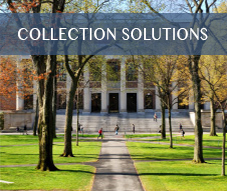Borrower Rights and Repayment Options
Loan Repayment
To learn about your repayment options, you can review available payment methods or contact a Delta representative.
- Please contact us at (800) 688-6337.
Loan Rehabilitation
In addition to the repayment options offered by Delta, you may be eligible to resolve your federal student loan through the loan rehabilitation program. To be eligible for rehabilitation, you will first need to agree upon a reasonable and affordable payment plan with Delta.
Your loan will not be considered rehabilitated until you have voluntarily made nine agreed-upon payments on time over a 10-month period and the loan has been purchased by a lender. It is important to understand that your creditor may add any outstanding collection costs to the principal balance, thus increasing the total amount you owe.
Once your loan is rehabilitated, you may regain eligibility for benefits that were available on your loan before you defaulted. Those benefits may include deferment, forbearance, alternative repayment plans, loan forgiveness and eligibility for additional federal student aid.
Other benefits of loan rehabilitation include:
- Default status will be removed on your defaulted loan;
- Default status will no longer be reported to the national credit bureaus; and
-
Wage garnishment and any withholding of your income tax refund made by the Internal Revenue Service (IRS) will be discontinued.
After rehabilitation, your monthly payment may be more than the amount you paid while you were rehabilitating your loan. Late payments reported to the national credit bureaus before the loan defaulted will not be removed from your credit report.
Loan Consolidation
You may have the additional option to remove your federal student loan out of default through loan consolidation. Loan consolidation allows you to pay off the outstanding combined balance(s) for one or more federal student loans to create a new single loan with a fixed interest rate.
A defaulted federal student loan may be included in a consolidation loan after you’ve made arrangements with your creditor and made several voluntary payments. Usually, you will be required to make at least three consecutive, voluntary and on-time payments prior to consolidation.
Administrative Wage Garnishment
Under the Higher Education Act of 1965, the U.S. Department of Education and guaranty agencies may require your employer to deduct 15% of your disposable income per pay period toward repayment of your defaulted federal student loan. Garnishment may continue until the entire balance of your outstanding loan is paid. You should note that wage garnishment is used only for borrowers who refuse to voluntarily repay their defaulted loan and is not used with those borrowers who continue to make regular and timely monthly payments.
Administrative Wage Garnishment (AWG) is a tool of last resort used to recover defaulted federal student loans. Thirty days prior to the issuance of the Order of Withholding, a notice will be sent to you that advises of intent to garnish wages, as well as your rights and appeal procedures.
You have the right to:
- Be sent a notice 30 days prior to ordering wage garnishment that explains the intention to garnish, the nature and amount of the debt, an opportunity to inspect and copy records relating to the debt, object to garnishment to collect the debt, and avoid garnishment by voluntary repayment;
- An opportunity to enter into a written agreement under agreeable terms to establish a voluntary repayment agreement;
- A chance for a hearing to present and obtain a ruling on any objection to the existence, amount or enforceability of the debt;
- An opportunity for a hearing to present and obtain a ruling on any objection that garnishment of 15% of disposable pay would produce an extreme financial hardship;
- A chance for a hearing to present and obtain a ruling on any objection that garnishment cannot be used at this time because he/she is now employed within a 12-month period after having been involuntarily separated from employment;
- Having garnishment action withheld by filing a timely request for a hearing, until the hearing is completed and a decision issued;
- Not to be discharged from employment, refused employment or subject to disciplinary action due to the garnishment, and to seek redress in federal or state court, if such action occurs; and
-
Not to have any information provided to the employer but what is necessary for the employer to comply with the withholding order.
To avoid garnishment of 15% of disposable pay, you must:
- Negotiate acceptable repayment terms and ensure that the first payment is received by the response deadline date on the garnishment notice, which is 30 days from the date the garnishment notice was sent;
- Make a hearing request in writing, postmarked no later than the deadline on the garnishment notice;
- If requesting copies of documents, make a request for a hearing, because requesting document(s) does not delay a garnishment order;
- Provide proof to support any objection made to the existence, amount or enforceability of the debt, or a claim of legal exclusion or financial hardship;
- Pay any expenses he/she incurs to obtain legal representation and to attend an in-person hearing; and
- Initiate any legal action against his/her employer, if the employer discharges, refuses to hire or takes disciplinary action against you based on the garnishment action.




